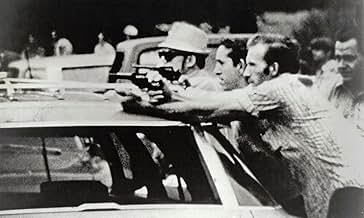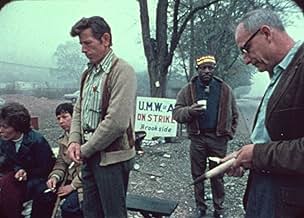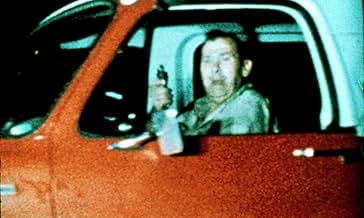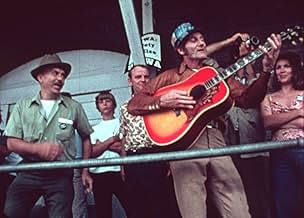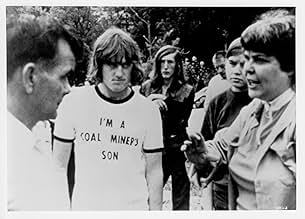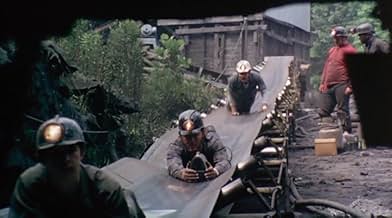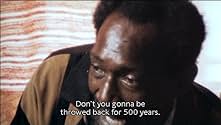Aggiungi una trama nella tua linguaA heartbreaking record of the thirteen-month struggle between a community fighting to survive and a corporation dedicated to the bottom line.A heartbreaking record of the thirteen-month struggle between a community fighting to survive and a corporation dedicated to the bottom line.A heartbreaking record of the thirteen-month struggle between a community fighting to survive and a corporation dedicated to the bottom line.
- Vincitore di 1 Oscar
- 9 vittorie e 1 candidatura in totale
- Self - Pres., UMW, 1920-1960
- (filmato d'archivio)
- Self - Black Ling Clinic., W. Va
- (as Dr. Donald Rasmussen)
- Self
- (as Dr. Hawley Wells Jr.)
- Self - Pres., UMW, 1962-1972
- (filmato d'archivio)
- Self
- (filmato d'archivio)
- (as Joseph "Jock" Yablonski)
- Self - Mine Foreman
- (as Basil Collins)
Recensioni in evidenza
It sometimes loses momentum as it documents the details of a particular labor strike in a mining town in rural Kentucky; yet that particular strike yields many memorable moments, including flashes of violence and revelatory dialogue. The company men are deliciously slick and slimy, and their goons are so ornery, that it's easy to forget that these people are real!
Where this film is at its best is where it uses historical footage and traditional labor songs to tie the strike to the larger past, and also where it explores other details of these people's lives -health issues, living conditions- that aren't specific to the strike. In this sense, the film becomes an important historical document of its own accord; unique, compelling, and enlightening to future generations.
This is a powerful Oscar-winning documentary produced and directed by Barbara Kopple ('American Dream', 'Wild Man Blues'). It focuses on the men at the Brookside Mine in Harlan, Kentucky who, in the summer of 1973, voted to join the United Mine Workers of America (UMWA). Duke Power Company and its subsidiary, Eastover Mining Company, refused to sign the contract. The miners came out on a long strike, registered by Kopple with testimonies, backstories, archival footage, and music, particularly that of Hazel Dickens during the final credits.
The film's main strength resides in the sincerity of its emotional, political and sociological core without being overtly sentimental, and Kopple's way of testifying instead of exploiting the subjects. The miners and their wives are not depicted in old hillbilly stereotypes, but rather as hard-working human beings fighting for their basic rights ('together we stand, divided we fall').
Thirty years after the release of this documentary, five miners died in an explosion at Harlan County. When the film was shot, money was the bigger issue (industry profits rose 170% in 1975, but miner's wages rose only 4%); nowadays, however, safety is an even bigger issue. You'd think things would have been largely improved since then, but that's not really the case. 'Harlan County U.S.A.' is a remarkable documentary because it testifies and proposes solutions about a public struggle that shouldn't be overlooked, yet has been for such a long time, in the "land of the free and home of the brave".
The miners and the picketers are captured via a well-maintained cinema verite style to the point that much of the early dialogue in the film is indiscernible and lingers there only as a means to introduce the tone. Music plays a key role in the emotional impact of this gritty film as well. Considering it takes place in the Bluegrass State, it comes as no surprise that so many of the most intense moments in the film carry with them a heart-wrenching rendition of roots music, most of which pertain specifically to coal mining.
"Harlan County USA" removes the presumptions that such human atrocities are far gone memories of America's past, and would pave the way for other important pro-workers rights films as "Norma Rae", "Silkwood", and "Matewan".
I guess it just goes to show how struggles with the cost of living aren't anything new, and this documentary does a great job of dispelling the idea that everyday people are greedy and want excessive amounts of money. I think most people are underpaid, and people just want the kind of compensation that will lower the stress of life. Bosses and people in charge always seem to hoard money. If this is the way things have to be run, then people who do hard work (and a lot of it) should be appropriately compensated. It's just a shame that some people view protests like this as radical or excessive, and I think a documentary like Harlan County USA could help change minds and attitudes.
Look, it's overall a very good documentary. The simple, natural style works. It's persuasive. Unions are good. I can't fault this stuff.
But this genuinely has one of the worst soundtracks I've ever heard, so uh, I'm sorry... points off for that (the god-awful music just never stops either).
Lo sapevi?
- QuizWhen filming began, the film was intended to be about the 1972 campaign by Arnold Miller and Miners For Democracy to unseat UMWA president Tony Boyle, in the aftermath of Joseph Yablonski's murder; however, the Harlan County strike began and caused the filmmakers to change their principal subject, with the campaign and murder becoming secondary subjects.
- Citazioni
Hawley Wells Jr.: [...] that was when I learned my first real political lesson, about what happens when you take a position against the coal operators, against the capitalists... I found out that the union officials were working with the coal companies. I also found that the Catholic hierarchy was working with the coal companies. Here was a combination of the whole thing, you see: you had to bump against the whole combination of them.
- ConnessioniFeatured in Cinéma Vérité: Defining the Moment (1999)
I più visti
- How long is Harlan County U.S.A.?Powered by Alexa
Dettagli
- Data di uscita
- Paese di origine
- Sito ufficiale
- Lingua
- Celebre anche come
- Harlan County, USA
- Luoghi delle riprese
- Azienda produttrice
- Vedi altri crediti dell’azienda su IMDbPro
Contribuisci a questa pagina



